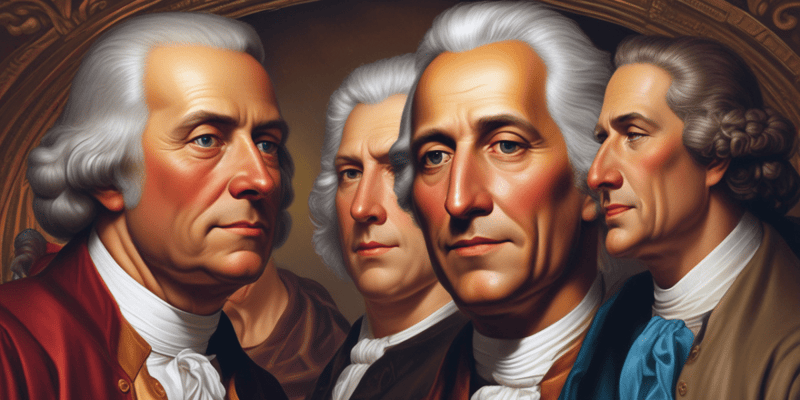Questions and Answers
Which philosophical movement laid the intellectual foundations for the political upheavals of the 18th century?
Enlightenment
Who were some Enlightenment thinkers who challenged the status quo by promoting individual rights and democracy?
Montesquieu, Voltaire, Rousseau
Which major revolution was a pivotal event in world history and challenged the power of the British monarchy?
American Revolution
What principles were solidified by the American Revolution?
Signup and view all the answers
Which 18th-century development reshaped the Western political landscape through the spread of liberalism and secularism?
Signup and view all the answers
What was a key difference between the American Revolution and the French Revolution?
Signup and view all the answers
Which event demonstrated the willingness of American citizens to fight for their freedom?
Signup and view all the answers
Which statement best describes the impact of Enlightenment ideas on monarchy during the 18th century?
Signup and view all the answers
What role did the American Revolution play in boosting the confidence of other groups seeking rights?
Signup and view all the answers
Which event reshaped political life in Europe by sweeping away some monarchies and modernizing others?
Signup and view all the answers
Study Notes
Eighteenth-Century Political Formations: Enlightenment Ideas, Revolutions, and Monarchy
The 18th century ushered in a period of profound intellectual and political transformation, characterized by the spread of Enlightenment ideas, the clash of colonial powers, and the birth of two major revolutions that would reshape the course of Western history. This article delves into the dynamic interplay of these subtopics, which collectively shaped the political landscape of the time.
Enlightenment Ideas
The Enlightenment, a philosophical movement that flourished from the late 17th to the mid-18th century, laid the intellectual foundations for the political upheavals that would ensue. Enlightenment thinkers, including figures like Montesquieu, Voltaire, and Rousseau, challenged the status quo by promoting ideas such as individual rights, the separation of powers, and the natural equality of all human beings. Their works inspired the spread of liberalism, democracy, and secularism, serving as a catalyst for change in the 18th century.
American Revolution
Building upon Enlightenment ideas, the American colonies sought to break free from British rule in the 1760s and 1770s. The American Revolution, which culminated in the Declaration of Independence in 1776, was a pivotal event in world history. It not only challenged the power of the British monarchy but also solidified the principles of limited government, democracy, and national sovereignty. The success of the American Revolution served to boost the confidence of other groups seeking to assert their own rights.
French Revolution
The French Revolution, which began in 1789, was a direct response to the grievances of the French people and a product of Enlightenment ideals. Unlike the American Revolution, which sought to establish a limited monarchy, the French Revolution aimed to dismantle the old order and create a new society based on the principles of liberty, equality, and fraternity. This period of revolutionary upheaval resulted in the execution of King Louis XVI in 1793 and the rise of Napoleon Bonaparte a decade later.
Revolutionary War
The American Revolution gave rise to the Revolutionary War, a global conflict that pitted Britain and its allies against the newly independent United States. The war, which lasted from 1765 to 1783, was a watershed moment in American history. It not only established the sovereignty of the United States but also solidified the nation's commitment to liberal democratic ideals. The Revolutionary War demonstrated the resilience of the American cause and the willingness of its citizens to fight for their freedom.
Monarchy
The end of the 18th century saw the continued relevance of monarchy, although the nature of monarchical rule had evolved significantly. European monarchs were forced to adapt to the changing political landscape, as Enlightenment ideas and revolutionary sentiments reshaped the contours of political life. Some monarchs, such as Frederick the Great of Prussia, successfully modernized their regimes, while others, like the French Bourbon monarchy, found themselves swept away by the forces of revolution.
In summary, the 18th century witnessed the rise of Enlightenment ideas, the American Revolution, the French Revolution, and the Revolutionary War. These events, alongside the continued presence of monarchy, transformed the political landscape of the time. The 18th century set the stage for future political and intellectual developments, as the world began to grapple with the complexities of liberty, democracy, and national sovereignty.
Studying That Suits You
Use AI to generate personalized quizzes and flashcards to suit your learning preferences.
Description
Test your knowledge on Enlightenment ideas, American Revolution, French Revolution, Revolutionary War, and the evolving role of monarchy in the 18th century. Explore the political transformations that shaped Western history during this dynamic period.



